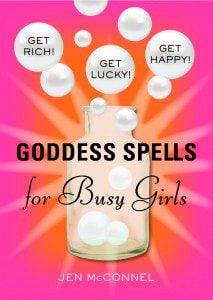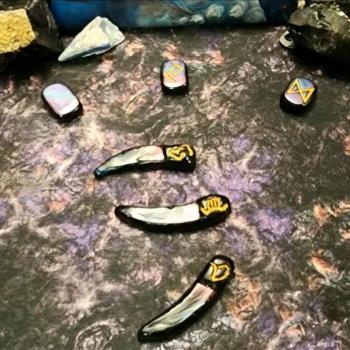Review by Hannah E. Johnston
Back in the nineties and earlier noughts, when I was writing about magic books for young adults, most of the books available referenced various TV shows and films that displayed magic as a tool box or a style manual to help you find friends and influence people. There were a handful of books written by real practitioners of witchcraft and magic that were genuinely interested in showing young people a way to be in tune with nature and grow in their knowledge of themselves. Fiona Horne, Teresa Moorey, and the ubiquitous Silver Ravenwolf, amongst others, were all writing to this audience, and it seems that although that generation of teens may have grown, there is now a new audience for these books.
Goddess Spells for Busy Girls: Get Rich, Get Happy, Get Lucky by Jen McConnel appeals to a wide audience of magic-keen young women. Rather than focusing purely on magical operations, this book is structured around cross-cultural Goddesses and outlines magic drawn from these ancient icons of power and wonder. The book is a catalogue of spells for a multitude of purposes that might be relevant to a young person’s needs – “Spell to Eliminate Self-Judgment” and “Spell for Enhanced Confidence,” for example. The majority of the spells are therapeutic; they emphasize using Goddess energy for self-betterment, self-knowing and personal transformation. Each chapter has a particular focus and Goddesses are chosen to fit under the chapter’s topic – home, love, wellbeing and abundance. A Goddess is introduced and McConnel outlines certain components of her myths, interpreting them to help the reader connect to their (sometimes) rather oblique stories. There is a simplicity to the myths and a clarity in the spells’ directions that would appeal to a teenage audience. Despite this somewhat formulaic approach, what is really nice here is that each chapter is introduced with a personal story from McConnel, demonstrating how the use of magic can help reframe some of life’s more challenging aspects. I found the portrayal of her first time abroad particularly moving as she described the perils and the triumphs of going it alone. This is the thrust of the whole book – Goddess magic is a pathway to ‘Knowing Yourself’.
Goddesses from different cultural pantheons are used in each chapter, adding a distinctive multicultural flair. Ancient and ‘live’ religious traditions are referenced, and despite some reservations about using Goddesses from Hindu, Buddhist, Christian and First Nations traditions ‘out of context’, the magical operations here are of the most basic forms and are unlikely to cause offence to practitioners of those faiths.
In magical terms, all of the spells here are simple. There isn’t a lengthy treatise on the morality of using magic, but McConnel assumes a common-sense approach. What really struck a chord with me was the attitude of ‘stay grounded, stay focused and respond to your needs’. Each spell requires certain ingredients, but as McConnel details in the introduction, less is more. She has really considered the budget and availability of resources for a young audience. The ingredients are mainly accessible items – mirrors, needles, cinnamon, matches, twigs and feathers, stones and fruit. At times there are no ingredients required at all. This is a really important move away from the commercialism that plagued teen witchcraft marketing ten years ago. The “Spell for Grief” calling upon Mary (Mother of Christ, pg. 55) is one of the most heartfelt spells in this book and needs just a blue candle and an hour’s time. Likewise the “Spell for Protection” calling upon Gaia (pg. 130) asks for comfortable walking shoes and somewhere to walk to!
It was only in Chapter Two where I felt confused about the book’s intended audience. Here, there’s a lot of discussion of sexual relationships that suggests a mature reader. I missed the kind of discussion Fiona Horne or the earlier writers on teen magic included about Pagan sexual ethics. For example, “Spell to Spice up Your Nights” (pg. 41) or “Spell for Sexual Compatibility” (pg. 67) are not issues I would want my 13-year-old to be thinking about! Consequently, I would not suggest this book for a really young reader.
Goddess Spells for Busy Girls is an accessible, warm and lighthearted book introducing a young adult reader to the magic of world Goddesses. My only reservation would be the pick and mix nature of this approach — I wonder in fact if the author believes in Goddesses as energy sources available to tap into — a kind of ‘plug/socket’ metaphor as author Isaac Bonewits once outlined. However, perhaps this isn’t important if the book inspires the reader to find out more about the world’s Goddesses and encourages, as it clearly does, girls to be strong, creative and empowered individuals who see themselves mirrored in the many faces of the divine.
 Witch, musician and mother, Hannah E. Johnston is a long-time Pagan and passionate supporter of our next generation. She was raised in a Pagan family and has led rituals and rites for families all over the world. She wrote her PhD on teenage witchcraft, is currently a Child and Family Liaison Officer in the Pagan Federation, and co-runs a Pagan Family Meet Up in her region. When not writing, travelling and chasing after her boys, she can be found in her studio conjuring up a song or two. She lives near Cambridge, UK.
Witch, musician and mother, Hannah E. Johnston is a long-time Pagan and passionate supporter of our next generation. She was raised in a Pagan family and has led rituals and rites for families all over the world. She wrote her PhD on teenage witchcraft, is currently a Child and Family Liaison Officer in the Pagan Federation, and co-runs a Pagan Family Meet Up in her region. When not writing, travelling and chasing after her boys, she can be found in her studio conjuring up a song or two. She lives near Cambridge, UK.














